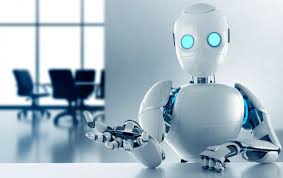Source: jaxenter.com
AI is developing at whirlwind rates. While nobody can say for certain how it will impact our work and personal lives, we can make a good few educated guesses. Also, with COVID-19 limiting human interaction in the built environment, advancements in AI and automation are on course to accelerate (providing funding is available, of course).
The age-old fear among some of the population is that AI will displace workers, leading to high levels of unemployment. A report by management consulting firm McKinsey shows that between 400 million and 800 million individuals across the globe could be “replaced” by automation and need to find new jobs by 2030.
However, AI could also create more jobs, as long as people are willing to adapt and work smarter. Research by PwC suggests that AI will add more to global GDP by 2030 than the combined current output of China and India.
So, in what ways could artificial intelligence change the future of work?
Shared augmented workplaces
The virtual communication technologies being developed currently will dramatically enhance the way we experience remote working. Widespread access to WiFi and portable devices have led to an increase in dispersed teams. Companies are replacing their traditional offices with virtual offices, enabling them to access global talent.
Holographic transportation can imitate the physical face-to-face interactions that add value to our workplace experience; the things we usually miss out on when telecommuting. In place of video conferencing screens, augmented reality allows us to collaborate in real time with our coworkers through 3D holographic images and avatars.
Check out Microsoft’s Spatial app for more insight.
Advancements in telerobotics have given humans the ability to operate machines remotely. This area of technology could also give rise to ubiquitous remote working; when teamed with holographic transportation, it could change how we work forever. Telerobotics is facilitated by broadband communications, sensors, Internet of Things (IoT) technologies. 5G and Mobile Edge Computing (MEC) will accelerate the adoption of telerobotics and teleoperation.
The way we recruit will change
AI and machine learning are already changing the way we recruit employees. Technology enables us to analyse thousands of profiles and compile a list of relevant candidates efficiently. Following the shortlisting process, AI technology can be used to communicate with candidates and keep them engaged at every stage of the recruitment journey.
There are lots of AI recruitment tools out there today that help businesses hire remote workers. Users can assess a candidate’s skillset, get an insight into their personality, and even gauge to some extent whether or not they will “fit” with the culture of the company. Some solutions deliver online assessments to candidates and use AI to grade them. Facial recognition technology is used to detect any cheating.
Once the right candidate has been chosen, AI-enabled chatbots can be used (alongside human intervention) to facilitate the onboarding process, helping new starters understand everything from internal processes to the company culture.
AI also has the potential to minimise bias when it comes to recruitment and performance reviews, as candidates are assessed in a more fact-based way. It can also help HR professionals to pinpoint areas of bias in the company and resolve it efficiently. As a result, AI has the potential to make our “virtual” workplaces more inclusive and diverse.
AI can also be used to upskill new employees and indeed minimise the skills gap. Multinational engineering, industrial, and aerospace conglomerate, Honeywell, has developed a simulator for training purposes. Their solution, which helps reduce training time by 60%, enables the user to simulate tasks through virtual environments which are accessed through the cloud.
We’ll be more efficient
When artificial intelligence teams up with the Internet of Things, trend prediction can be done quickly, making businesses more efficient, sustainable, and effective. In time, it will also change the way companies are run, with humans collaborating with AI brains to solve complex problems. (Yes, there will still be a need for human input.)
As well as trend mapping, AI will make it easier for businesses to accurately identify any challenges. Businesses utilising AI and data (responsibly) could also significantly improve the customer and employee experience. Workers will have more time to focus on creatively fulfilling rather than repetitive tasks that machines will do. As a result, HR teams will be able to focus on more strategic work.
There are tools available that use robotic process automation (RPA) to monitor workflows and make informed/ intelligent suggestions as to how tasks can be managed more effectively. They are able to identify when an individual is struggling with a problem and can provide assistance or point the worker in the right direction for human help.
Today and in the foreseeable future at least, AI in the context of work is all about complimenting and maximising human input as opposed to replacing it. It’s about eliminating the mundane and freeing us up to focus on the creative things only humans can do.
